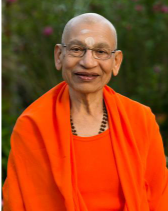
Spirituality

By Swami Viditatmanand Saraswati*
Hearing the explanation of the minister, the king became happy. The minister and all the members of his court also accepted that whatever īśvara does is for our wellbeing.
It is not easy to accept everything happily that happens in our life. Therefore, we talked about accepting it as prasāda of īśvara. Such prasādabuddhi does not develop overnight.
However, if we understand the truth of life that īśvara is the creator of the universe, He is the controller of the universe, He is fair, He is everyone’s well-wisher, then it is not impossible to cultivate prasādabuddhi. However, to accept any unpleasant situation or problems in life as hari īcchā, God’s desire and not to face them and stay inactive is not called prasādabuddhi.
Prasādabuddhi does not mean to stay inactive and not face the situation in any manner. Situations continue to arise. When they are unfavourable and if we do not do anything about them, that attitude is not prasādabuddhi. Bhagavāna creates the situations and wants us to do our duty in those situations. There is nothing wrong with trying to change a situation if it is unfavourable. We must put in the effort. However, after sufficient effort, we happily accept whatever the outcome we get, that is called prasādabuddhi.
Thus, we dedicate the karma to īśvara with the goal of pleasing him and accepting the karmaphala as prasāda. If we transact with īśvara in this manner, it is called karmayoga.
Bhagavāna says, “Arjuna, you abide in yoga while performing karma. While performing karma, have yogabuddhi, meaning practice iśvarārpaṇa buddhi. Have an attitude to please īśvara with your karma. When a question arises whether to please ahaṅkāra or īśvara, side with īśvara. In doing so, you will have to renounce your ahaṅkāra, rāga – dveṣa, and demands. And in doing so, your antaḥkaraṇa will continue to purify.”
What does it mean by not siding with ahaṅkāra? Giving another definition of yoga, Bhagavāna says,
“योगस्थः कु रु कर्माणि सङ्गं त्यक्त्वम धनञ्जय।
णसद्ध्यणसद्ध्योः सर्ो भूत्वम सर्त्वं योग उच्यते।।2.48।।”
Arjuna, perform actions while remaining steadfast in yoga, abandoning attachment from karmaphala meaning keeping the same attitude towards success and failure. This evenness of mind is called yoga.
Not to side with ahaṅkāra means not having an attachment to karmaphala. One should attempt to look at success and failure with the same attitude. Success is prasāda from īśvara. And, failure is also prasāda from īśvara. Success and failure are imaginations created by ahaṅkāra. Ahaṅkāra thinks of success as the achievement of materialistic success such as the wealth, respect, fame, and power that can nourish the self. And, if any of them is not achieved or is lost after achievement, ahaṅkāra calls it a failure.
However, this is not an accurate standard to measure success or failure. The spiritual success in the form of the grace of īśvara and purified antaḥkaraṇa should be called real success. If we see it from this point of view, a karmayogi never fails. A karma performed with the attitude of pleasing īśvara will definitely bring the grace of īśvara and success in the form of purified antaḥkaraṇa. There is no need to plead for such success either. You perform the karma and just dedicate it to īśvara. Let īśvara decide on the outcome. By doing this, you will be able to maintain composure in favourable and unfavourable situations. Every situation is an outcome of one or the other karma, and if we have the attitude of prasāda from īśvara or grace of īśvara, the mind will remain free from the impulses of happiness and sorrow, rāga and dveṣa. Every situation will be evaluated with composure, impartiality and selflessness; therefore, appropriate responses can be shown in that situation. Thus, the mind of a person with prasādabuddhi can maintain equanimity. The equanimity of the mind is called yoga.
In this manner, two definitions of yoga or two aspects of yoga are given. Yogastha means selflessness or iśvarārpaṇa buddhi while performing karma, and samatva or prasādabuddhi while accepting the karmaphala is called yoga.
Niṣkāma karma – a gateway to mokṣa (selfless action – a gateway to freedom)
Arjun, karma performed with yogabuddhi, meaning selflessness, is far superior to the karma performed with an attachment to its outcome. Karma performed with an expectation may bring in material success but it also brings the notion of success and failure.
When karma is performed with ahaṅkāra, only ahaṅkāra has to accept the praise and censure. If ahaṅkāra gets praise, it congratulates the self and when it gets censured, it hates the self. The impulses of self-compliments and self-hatred are born out of the attachment to karmaphala. When karma is performed with the attachment to karmaphala, it generates such impulses and therefore, unrest and conflict remain in the mind. Moreover, one does not get satisfied with the success. There is always something that can be improved or increased in success. And therefore, the human mind always keeps expecting something more after each success. Thus, from a material point of view also, one is not satisfied with karma or karmaphala. Therefore, Arjun, if the goal of life is spiritual upliftment, it is not appropriate to perform karma to fulfil desires. Those who make karma the means of getting results are miser; because, if karma is performed selflessly to please īśvara, it becomes an instrument to gain mokṣa, liberation by purifying antaḥkaraṇa. When karma is performed with selfish reasons to please ahaṅkāra, then the same karma simply fades away by giving material results and creates many types of adverse effects and keeps one stuck in the cycle of life by depriving him of mokṣa. The yogi who performs karmas selflessly first gets liberated from rāga – dveṣa and ultimately gets liberated from ignorance by gaining knowledge. Once ignorance is removed, the ahaṅkāra originating from that is nominal. Jñānī has ahaṅkāra for the sake of worldly transactions but he has no beggerliness. He is freed from the bondage of birth and death and attains the status of paramātmā who is free from all miseries. In this manner, the attitude of yoga becomes an instrument for a seeker to achieve the ultimate goal. Therefore, Arjuna, you take refuge in yogabuddhi. A characteristic of yogabuddhi is such that it makes karma an instrument of liberation which otherwise has a nature to create bondage. This is a skill of karmayoga that makes karma useful for attaining liberation.
Explaining how exalted status is achieved with a yoga attitude, Bhagavāna says that the yogi’s mind slowly frees from delusion. As antaḥkaraṇa becomes pure, attachment to viṣaya born out of lack of discrimination gets removed. Dispassion toward viṣaya from here and hereafter rises. Those disturbances that were rising due to the attachment to the viṣayas in mind also go away. Ātmā, which means self, becomes more and more acceptable. And in this manner, the mind becomes steadier in ātmā. In doing so, ultimately, he completely abides in ātmā and attains jñānasamādhī. He becomes a yogi in a true sense. Therefore, karmayoga becomes an instrument to attain the ultimate goal of life.
*Swami Viditatmananda Saraswati has been teaching Vedānta Prasthānatrayī and Prakaraṇagranthas for last 40 years in Ahmedabad, Gujarat. Throughout the year, he conducts daily Vedānta discourses, accompanied by retreats, and Jñāna Yajñas on Vedānta in different cities in India and in foreign countries.





